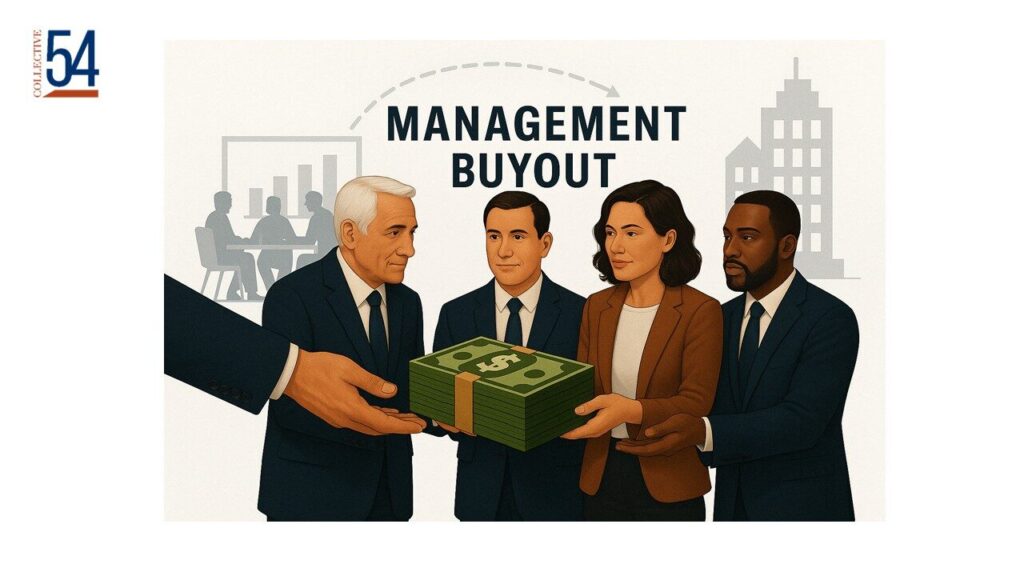|
Getting your Trinity Audio player ready...
|
Management Buyouts: A Hidden Exit Path for Founders of Boutique Professional Services Firms

If you are a founder of a boutique professional service firm generating between $5 million and $50 million in revenue and $1 to $5 million in EBITDA, odds are you’ve thought about your exit. You’ve likely flirted with selling to a strategic buyer or private equity group. And if you’re like most Collective 54 members, you’ve probably run into the same roadblocks: no viable buyer, or a viable buyer who doesn’t give a damn about your employees or clients.
Enter the management buyout (MBO)—a lesser-known but increasingly relevant path for founders in our community.
What is a Management Buyout?
An MBO is a transaction where the next generation of internal leaders—those already running the firm—acquire full ownership of the business. It’s a way for founders to exit on their own terms, preserve their legacy, and reward the team that helped build the firm.
These deals are typically funded through a combination of:
- Seller financing: The founder acts as the lender.
- Third-party lending: Traditional bank debt or Small Business Administration (SBA) loans.
- Earn-outs: Part of the purchase price is paid only if performance targets are hit.
The management team usually doesn’t need to have millions in the bank to buy the business—contrary to popular belief.
Why MBOs Appeal to Boutique Founders
There are two big reasons our members lean into MBOs:
- Lack of External Buyers: Many founders try to sell but don’t get serious offers. The buyer pool is shallow in services.
- Preserving the Culture: Founders care deeply about the firm’s people and clients. A sale to outsiders risks destroying that.
An MBO addresses both. The successors already embody the firm’s values, and their success is aligned with the firm’s long-term health.
Key Deal Dynamics
Most MBOs in our community trade at EBITDA multiples of 6x to 10x, translating to deal sizes of ~$5 million to $50 million.
The founder typically stays on for 1 to 3 years, often as a board member or advisor. This transitional period is crucial to ensuring the next generation succeeds.
These deals often include performance hurdles and covenants like:
- Minimum EBITDA thresholds: Buyer must maintain profitability to avoid default.
- Revenue retention clauses: Specific clients must be retained.
- Time-based payments: Payments are spread out over several years.
- Clawback provisions: If certain goals aren’t met, part of the equity or cash may revert to the seller.
Three Things That Make or Break an MBO
- Price – Can the seller and buyer agree on valuation? The 6x–10x range is negotiable based on growth rate, client concentration, and recurring revenue.
- Terms – Will the founder give enough time for the buyer to repay? The longer the runway, the more likely the deal gets done.
- Succession Readiness – Are the successors actually ready to run the firm without the founder? Training and phased transition matter.
How MBOs Compare to Other Exit Options
Exit Option | Pros | Cons |
MBO | – Values preserved- Familiar leadership- Discreet | – Financing complexity- Buyer inexperience |
Strategic Sale | – Big upfront check- Potential growth synergies | – Culture clash- Loss of control |
Private Equity | – Liquidity with potential upside- Operational help | – High-pressure growth- Potential churn in leadership |
Decision-Making Framework
Ask yourself:
- Legacy vs Liquidity: What matters more?
- Speed vs Stability: Are you in a rush or can you transition gradually?
- Hands-off vs Hands-on: Do you want to walk away or mentor your successors?
If legacy, stability, and mentoring matter to you—an MBO is likely your best path.
Final Word
MBOs are underutilized in the professional services sector. They’re not flashy. They don’t make headlines. But for founders in Collective 54, they just might be the most practical and rewarding way to exit.
If you’re a member and thinking about a management buyout, reach out to me directly. And if you’re not a member yet, what are you waiting for?
Join Collective 54—where we scale, sell, and exit smarter.
